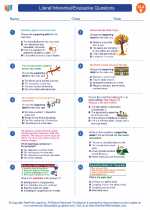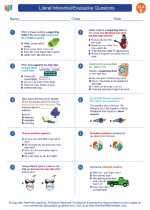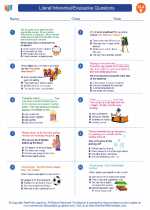Literal/Inferential/Evaluative Questions
Explanation
When reading a text, it's important to ask different types of questions to fully understand and analyze the material. Literal, inferential, and evaluative questions are three types of questions that help readers engage with the text on different levels.
Literal Questions
Literal questions focus on the explicit information presented in the text. These questions can usually be answered by finding specific details or facts directly stated in the text. They require minimal interpretation and generally have a single correct answer. For example: "What color is the main character's car in the story?"
Inferential Questions
Inferential questions require readers to make educated guesses or draw conclusions based on the information provided in the text. These questions often involve interpreting and analyzing the text to understand implied meanings or make connections. For example: "Why do you think the main character decided to confront the antagonist at that particular moment in the story?"
Evaluative Questions
Evaluative questions prompt readers to form judgments, opinions, or assessments about the text and its elements. These questions encourage readers to think critically and consider the text from a personal perspective. For example: "Do you agree with the protagonist's decision at the end of the story? Why or why not?"
Study Guide
Literal Questions
- What are some examples of literal questions?
- How do you identify the answers to literal questions in the text?
- Why are literal questions important for understanding the basic details of a text?
Inferential Questions
- What strategies can you use to answer inferential questions effectively?
- How do inferential questions help you gain a deeper understanding of the text?
- Can you provide examples of inferential questions from a text you have read recently?
Evaluative Questions
- Why is it important to consider different viewpoints when answering evaluative questions?
- What criteria can you use to form an opinion when responding to evaluative questions?
- How do evaluative questions encourage critical thinking and analysis of a text?
[Literal/Inferential/Evaluative Questions] Related Worksheets and Study Guides:
.◂English Language Arts Worksheets and Study Guides Fifth Grade. Literal/Inferential/Evaluative Questions

 Worksheet/Answer key
Worksheet/Answer key
 Worksheet/Answer key
Worksheet/Answer key
